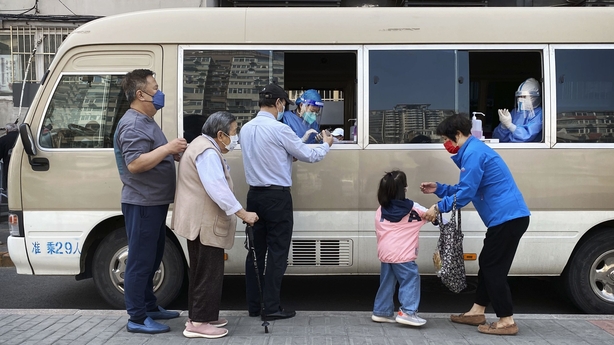Some of Shanghai's 25 million people came out for brief walks and grocery shopping today after enduring more than a month under a Covid lockdown.
Social media posts showed Shanghai residents strolling in their suburbs, or queuing up at supermarkets that had been allowed to reopen.
One picture showed two women carrying a pole with four bulky bags of groceries on their shoulders.
That was the result of an incremental easing of curbs in five of the city's 16 districts from Sunday, home to about a fifth of Shanghai's population, where some people were allowed to leave their housing compounds for the first time in weeks.
The level of the restrictions varied from one residential complex to another. In many compounds, a single person from each household could go out at a time, for a maximum three hours.
Most do not get permission to drive or even ride a bike, prompting jokes on social media.
Meanwhile the central Chinese city of Zhengzhou announced it would impose new Covid-related movement curbs from 4 to 10 May.
Schools in the main city district will go online, while employees with government organisations and companies in the area must work from home during that period, according to a statement on the city's official WeChat account.
Increasingly out of step with most other countries that have significantly eased or even completely lifted coronavirus restrictions, China has given no hint of deviating from its "zero Covid" policy.
China has accepted a heavy economic cost and demanded huge personal sacrifices from millions forced into prolonged isolation.
Many of these people have struggled with lost income, difficulty sourcing food and severe delays in access to emergency healthcare and other basic services.
This has led to rare outbursts of anger in a sensitive year for President Xi Jinping, who is widely expected to secure a precedent-breaking third leadership term later this year.
Chinese authorities say their Covid policies aim to save as many lives as possible, pointing to the millions of deaths Covid has caused outside China.
Beijing, with dozens of new cases daily in an outbreak in its second week, is banking on mass testing to locate and isolate infections and avert a Shanghai-like lockdown.

The capital of 22 million tightened Covid curbs over the five-day Labour Day holiday that runs through Wednesday, traditionally one the busiest periods for restaurants and tourism.
Twelve out of 16 Beijing districts will carry out a further three rounds of Covid tests between 3 and 5 May, following three previous rounds of screening last week.
The capital's restaurants were closed for dining in and some apartment blocks were sealed shut. Most other venues were either closed, or demanded a negative PCR test from visitors.
Streets were quiet, with many residents fearing they might receive a quarantine order if found to have been in the proximity of a Covid case.
Beijing's new daily cases have been relatively steady since the first infections in the capital emerged on 22 April, with a total of 62 detected on 2 May.
In Shanghai, the number of cases found outside quarantined areas was up to 73 from 58 - a setback after two consecutive days of zero such cases.
A period of zero cases in such areas, where some movement outside residential compounds is allowed, is a key requirement for a more significant relaxation of Covid curbs.

